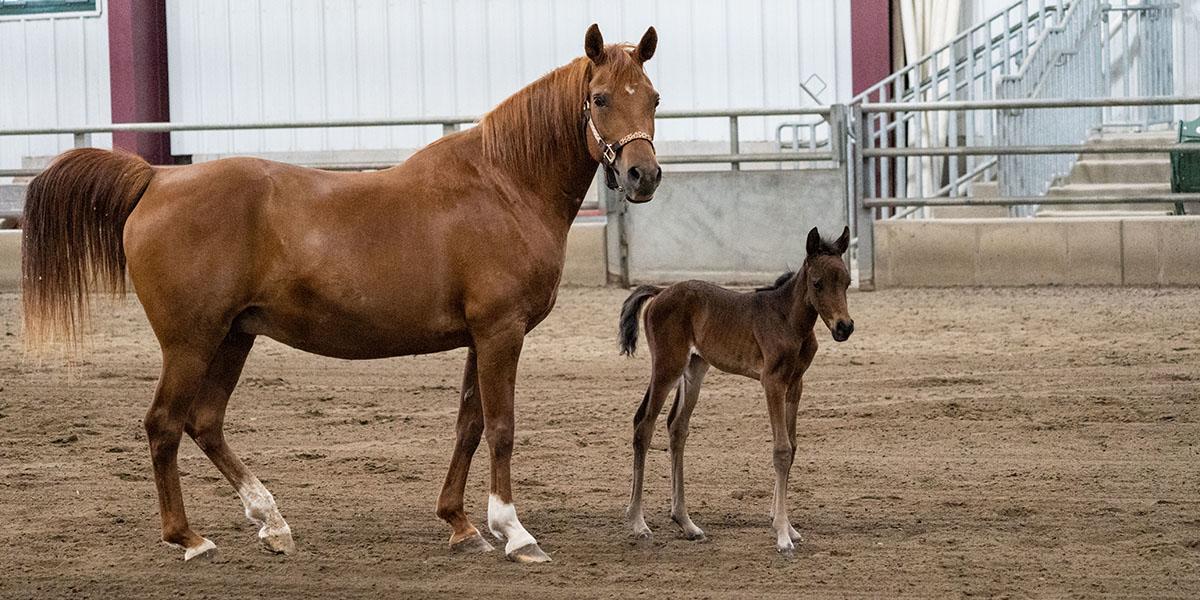A lucky break
Veterinarians race against the clock to save newborn foal from deadly infection

Veterinarians race against the clock to save newborn foal from deadly infection
Marra (left) and her foal Lucky take a walk through the Barenscheer Arena at the Leatherdale Equine Center.
The day of June 2, 2021, was initially a happy one for Ashley Landru and her 20-year-old Arabian horse named Marra. The mare had just given birth to a female foal, and now Landru waited for the newborn to reach three key milestones over the next few hours.
Within the first hour, a foal is expected to rise to its feet. Then it’s on to nursing independently in the second hour and passing waste in the third. The first hour had nearly ticked by before the young horse rose to its unsteady feet. She had a hard time standing, and Landru began to worry.
“By the end of the second hour, she was showing that she could not stand long enough to figure out how to nurse,” Landru says. “When she was up, she would walk under Marra to the other side but just could not figure out how to nurse. I tried holding her in place and guiding her mouth to find the milk. After that, she just seemed to get weaker and weaker.”
Landru’s regular veterinarian, Mary Huerter, DVM, was out on an emergency call but provided support over text and phone calls before placing a decision in Landru’s hands: wait for Huerter’s current appointment to finish or take Marra and the foal to the University of Minnesota College of Veterinary Medicine (CVM).
With time fleeting, Landru decided to pack the trailer and make the hour-long drive to the Piper Equine Hospital at CVM. Upon their arrival, Kaitlin Mielnicki, DVM, a large animal medicine resident, and assistant clinical professor Christie Ward, DVM, PhD, MVSc, DACVIM, were ready to jump into action to save the foal. Later, clinical professor Anna Firshman, BVSc, PhD, DACVIM, DACVSMR, would join the fray in caring for the newborn.
The little horse would eventually be named Lucky and not without reason.
“The foal was septic, meaning she had a bacterial infection in the blood. She was difficult to rouse on admission due to the severity of her infection,” Mielnicki says. “The infection caused low blood sugar, which required intensive management to stabilize. She also required a feeding tube, as she was unable to stand and nurse on her own, and she required another tube in her nose to deliver oxygen.”
Lucky’s care team began treating the infection and monitoring her condition around the clock. The first night after Lucky and Marra were admitted to Piper’s neonatal intensive care unit, Landru says she barely slept and woke up time and time again to check her phone to make sure she didn’t miss a call from the hospital.
After starting treatment, updates on Lucky’s condition became more and more positive, with photos and videos sent to Landru documenting the youngster’s progress. Lucky livened up, her zest for life slowly replacing the infection that ravaged her newborn body. Eventually came the good news: Marra and Lucky could return home.
Lucky now spends her day zooming around the pasture and investigating everything from children to barn cats while Marra soaks up the extra attention and treats from visitors.
We definitely made the best choice possible in bringing her to UMN. They were in the care of a team of amazing animal lovers, from vet techs to veterinarians and probably more people than I am even aware of. Thank you to everyone that helped our girls.
Ashley Landru
“We are so grateful to have both of our girls home. We are extremely thankful for the treatment that Lucky and Marra received,” Landru says. “We definitely made the best choice possible in bringing her to UMN. They were in the care of a team of amazing animal lovers, from vet techs to veterinarians and probably more people than I am even aware of. Thank you to everyone that helped our girls. This would not have been a happy story without all of you.”
The little horse also holds a special place in Mielnicki’s heart—and in her office. A picture of Lucky on her desk serves as a reminder of the foal’s incredible recovery.
“It is both heartwarming and inspiring to see a newborn foal come in so debilitated, to be involved so closely in the healing process, and to be able to discharge her from the hospital as feisty as ever,” Mielnicki says. “And while I wish we never had to meet—for Lucky’s sake—I am thankful for Ashley as a client. The entire experience was so fulfilling.”